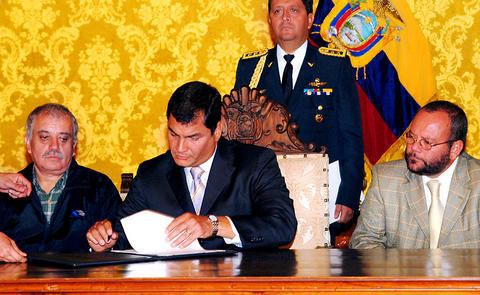Ecuadorian President Rafael Correa yesterday signed a decree to give the state almost all the extra oil revenues generated for foreign firms by high prices, sparking worries of more government control over the Andean country's key sector.
The decree raised the state share to 99 percent from 50 percent of "extraordinary revenues" produced by foreign oil companies above a set, contractual benchmark price.
The government expects to receive approximately US$700 million annually from the hike, which will affect the nation's largest investors -- Brazil's Petrobras and Spain's Repsol, as well as France's Perenco, China's Andes Petroleum and US-owned City Oriente .

PHOTO: AFP
The surprise announcement by left-winger Correa echoed measures introduced by Venezuelan President Hugo Chavez to increase state participation in his country's petroleum industry as part of his self-styled socialist revolution.
Ecuador's current law forces foreign oil companies to hand over at least 50 percent of their extra oil revenues. When that law was created last year, oil companies fretted over investments and some threatened to bring lawsuits.
Foreign oil "companies still make extraordinary profits, making the current contracts unfair for the Ecuadorian state," the presidential decree said.
The decree added that Correa, deemed it "necessary to regulate such profits more fairly and decided to change the law to reduce from 50 percent to 1 percent the oil windfall profits" for foreign oil companies.
Correa, a US-educated economist already spooking Wall Street with anti-free market rhetoric and talk of debt negotiation, said he wanted to renegotiate foreign oil contracts to raise the state share, but his government dismissed a Venezuela-style nationalization.
Oil Minister Galo Chiriboga said on Thursday night that the revenue hike was meant as leverage in the planned renegotiation with foreign oil firms.
"If they don't like their participation after the hike, we have to sit down and talk," Chiriboga said by telephone.
He added that he was confident foreign firms would not leave the country over the decree.
Chiriboga said the government would propose that foreign companies switch from current deals, which allow firms to have part of the oil they extract, to new contracts where the state will sell the crude itself and pay the companies a service fee to extract the product.
"This really took everybody by surprise and we don't have an official position at the moment," Federico Cruz, Repsol's spokesman in Ecuador, said of the decree.
A presidential legal counselor said the South America's No. 5 oil producer was ready to confront international and national arbitration over the increase.
"We are seeing Ecuador take a path similar to Venezuela," Roger Tissot, Latin American analyst with Washington-based consultancy PFC Energy. "The impact should not be a surprise; oil companies halting investment and we will continue to see a drop in production."
Private oil companies operating in Ecuador extract nearly half of the country's average daily output of around 530,000 barrels.
Ecuador has said Petrobras, Repsol, France's Perenco, China's Andes Petroleum and US-owned City Oriente have agreed to start renegotiation.
A Petrobras spokesman could not immediately be reached for comment.
Correa earlier this week said the contract renegotiations were going to be amicable.
Analysts say Correa's party's convincing victory in Sunday's vote for an assembly to rewrite the Constitution could strengthen his mandate to forge ahead with pledges to increase the state's role in the economy and natural resources.

Kehinde Sanni spends his days smoothing out dents and repainting scratched bumpers in a modest autobody shop in Lagos. He has never left Nigeria, yet he speaks glowingly of Burkina Faso military leader Ibrahim Traore. “Nigeria needs someone like Ibrahim Traore of Burkina Faso. He is doing well for his country,” Sanni said. His admiration is shaped by a steady stream of viral videos, memes and social media posts — many misleading or outright false — portraying Traore as a fearless reformer who defied Western powers and reclaimed his country’s dignity. The Burkinabe strongman swept into power following a coup in September 2022

TRUMP EFFECT: The win capped one of the most dramatic turnarounds in Canadian political history after the Conservatives had led the Liberals by more than 20 points Canadian Prime Minister Mark Carney yesterday pledged to win US President Donald Trump’s trade war after winning Canada’s election and leading his Liberal Party to another term in power. Following a campaign dominated by Trump’s tariffs and annexation threats, Carney promised to chart “a new path forward” in a world “fundamentally changed” by a US that is newly hostile to free trade. “We are over the shock of the American betrayal, but we should never forget the lessons,” said Carney, who led the central banks of Canada and the UK before entering politics earlier this year. “We will win this trade war and

‘FRAGMENTING’: British politics have for a long time been dominated by the Labor Party and the Tories, but polls suggest that Reform now poses a significant challenge Hard-right upstarts Reform UK snatched a parliamentary seat from British Prime Minister Keir Starmer’s Labor Party yesterday in local elections that dealt a blow to the UK’s two establishment parties. Reform, led by anti-immigrant firebrand Nigel Farage, won the by-election in Runcorn and Helsby in northwest England by just six votes, as it picked up gains in other localities, including one mayoralty. The group’s strong showing continues momentum it built up at last year’s general election and appears to confirm a trend that the UK is entering an era of multi-party politics. “For the movement, for the party it’s a very, very big

The Philippines yesterday slammed an “irresponsible” Chinese state media report claiming a disputed reef in the South China Sea was under Beijing’s control, saying the “status quo” was unchanged. Tiexian Reef (鐵線礁), also known as Sandy Cay Reef, lies near Thitu Island, or Pagasa, where the Philippines stations troops and maintains a coast guard monitoring base. Chinese state broadcaster CCTV on Saturday said that the China Coast Guard had “implemented maritime control” over Tiexian Reef in the middle of this month. The Philippines and China have been engaged in months of confrontations over the South China Sea, which Beijing claims nearly in its